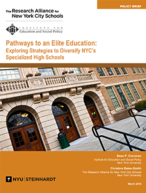I believe that the SSHAT Test should not be changed, but the procedures for taking the test must change. FYI, two of my daughters were accepted to Stuyvesant HS after taking the SSHAT. This fact does not change my opinion.
When I was President of the PTA at Booker T. Washington MS 54, the school was racially segregated and I tried to change this. I also tried to stop the misallocation of funds by the Principal. I was attacked, of course, by a group of the white parents, all of whom wanted their children to continue to receive the favors and treats of being white. Ironically, one of the parents who attacked me is the current
Parent Coordinator of JHS 54, Anne Pejovich. I have a mountain of information on her duplicity to share in my book in the sad chapter of parents fighting parents who speak up.
The
DELTA Honors program fed students directly into
Stuyvesant,
Bronx Science,
Edward Murrow,
Brooklyn TECH. The four other programs inside Booker T. did not permit students to take the SSHAT test. This was the problem. Let all kids who want to take the test TAKE IT. The unfairness in telling a child he/she cannot take the test simply because they are not "ready" or just "can't" is unfair and unjust. I and several other parents did a random survey of the schools in the upper west side of Manhattan by standing outside the schools after Parent visiting day, and we asked 2 questions: 1) is your child in 8th grade? 2) is your child taking the SSHAT test? The answers were surprisingly, no, they knew nothing about applying for the test or when it would be given.
DELTA was more than 90% white. The other programs at MS 54 reflected the neighborhood, mostly black or Hispanic. I live on the Upper East side, but my kids were accepted at DELTA because the former head of the program, Fred La Senna, accepted them, starting with my oldest, who had an IEP. She, and one of her sisters, wanted to go to Stuyvesant, took the test, and got in. No other school would have challenged either daughter, and Stuyvesant was the right learning environment for their learning style.
Change the way students apply to take the test, and we may begin to see more diversity in the Stuyvesant pool of incoming students. Don't change the test.
Betsy Combier
 |
| Stuyvesant High School |
New Study Explores Strategies to Diversify NYC’s Specialized High Schools
|
|
|
Today, the NYC Department of Education announced the results of the City’s high school choice process, including data about students admitted to the City’s eight specialized schools. As in past years, Black and Latino students are starkly under-represented among those receiving offers to these elite schools. A central question is whether the schools’ admissions policy—based exclusively on the Specialized High School Admissions Test (SHSAT)—is to blame for the lack of diversity.
A new brief, Pathways to an Elite Education: Exploring Strategies to Diversify NYC’s Specialized High Schools, examines students’ pathways from middle school to matriculation at a specialized high school, highlighting opportunities to intervene and improve access for underrepresented groups. The brief also simulates the effects of various admissions criteria that have been proposed as alternatives to the current SHSAT-based admissions policy, including state test score, grades, and attendance. In general, we found that these rules would increase the share of Latino, White, and female students. But, most of them would not appreciably increase the share of Black students nor reduce the concentration of offers in a small number of middle schools.
“The real take-away is from this study is the lack of diversity in the specialized schools is a much bigger problem than ‘to test or not to test?’” said James Kemple, the Research Alliance’s executive director. “We need to think more broadly about how to reduce inequality in New York City’s schools—identifying strategies that create opportunities for traditionally disadvantaged students will be a primary focus of the Research Alliance’s work in coming years.”
|
|
|
|
|
|
The Research Alliance for New York City Schools is a nonpartisan research center housed at the New York University Steinhardt School of Culture, Education, and Human Development. The Research Alliance conducts rigorous studies on topics that matter to the city’s public schools. The organization strives to advance equity and excellence in education by providing evidence about policies and practices that promote students' development and academic success.
|
|


No comments:
Post a Comment
Please do not use offensive language